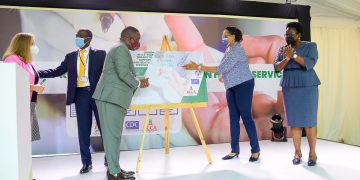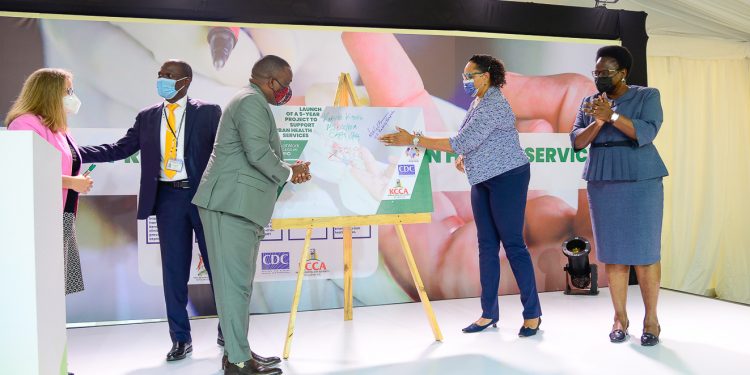The United States Embassy in Uganda and Kampala Capital City Authority (KCCA) have launched a UGX 6billion grant ($1.6million) targeting to improve health services in the Kampala City and Metropolitan areas.
The grant, represents the first-year of funding of a five-year partnership between the U.S. Centers for Disease Control and Prevention (CDC) and KCCA.
The project is aimed at improving access to HIV and TB services, and focus on specific health challenges faced by the urban poor like recurrent cholera and typhoid outbreaks.
It will further strengthen the capacity of the KCCA health team to plan, monitor, and prevent urban health issues.
Since 2010, CDC has been supporting KCCA through the Infectious Diseases Institute (IDI) to implement comprehensive HIV and TB services in six high-volume public health facilities as well as supporting services in private not-for-profit and for-profit facilities and centers of excellence.
According to the US Ambassador to Uganda, Natalie Brown, the grant will also support the KCCA health team to provide leadership and oversight of the health sector, both public and private, in this region.
The Lord Mayor of Kampala City, Erias Lukwago appreciated the Executive Director, the Directorate of Public Health and all other partners including Centre for Disease Control (CDC) for realizing this timely partnership.
He said Kampala is faced with lots of health care challenges due to the huge population but this partnership will support improved health care service.
“But also, when the comorbidities aggravating the pandemic are addressed, the people of Kampala and Greater Kampala Metropolitan Area will have all the reasons to celebrate,” Lukwago said.
Kampala has an HIV prevalence of 6.9% among adults aged 15 to 64 years which is higher than the national prevalence of 6.2% according to the 2016 Uganda Population HIV Impact Assessment.
Furthermore, the estimated TB prevalence is 501 TB cases per 100,000 persons which is higher than most urban settings in Uganda according to the 2014 Uganda TB Prevalence survey.
Lukwago appreciated the Ambassador for the tranche of both Pfizer and Moderna Covid-19 doses all amounting to 2.3M from the USA.
Meanwhile, After launching the CDC-KCCA project, Brown visited a nearby U.S. Agency for International Development (USAID) supported vaccination site to speak with health workers and Kampala residents who came out to receive COVID-19 vaccines donated by the United States.
Brown said that she was pleased to see more than 1.6 million Pfizer COVID-19 vaccine doses donated by the United States are being used at 58 vaccination sites throughout Kampala as part of a comprehensive effort to combat COVID-19 and save Ugandan lives.
She thanked the front-line health workers administering the jab and community mobilizers who have been providing accurate information about COVID-19 vaccine safety and effectiveness.
In September, the United States delivered a total of 2,321,350 COVID-19 vaccine doses to Uganda. The vaccine is being rolled out at 58 outreach sites in Kampala, Mukono, and Wakiso.
“Today, several Kampala residents I spoke with told me why it was important for them to get vaccinated and why they think others should take COVID-19 seriously and get the jab too, I encourage everyone who is eligible to take that important step toward protecting your health and the health of your community,” Brown said.
She added, “Covid-19 vaccines are safe, effective, and one of the best tools we have in reducing unnecessary illnesses and deaths.”
Ambassador Brown said, The United States has committed to donating 1.1 billion Pfizer doses worldwide and is the leading financial donor to the COVAX facility that also is providing COVID-19 vaccines to Uganda and many other countries.
In Uganda, since the pandemic began, the United States has provided assistance valued at $111 million (nearly UGX 400 billion) to support Uganda’s COVID-19 response.











